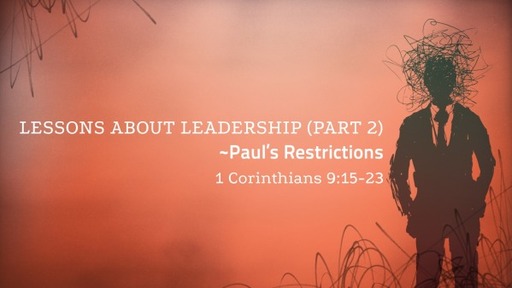Lessons about Leadership (Part 2)

Paul’s Restrictions
I. The Leader’s Character (v.15-17)
(I)A. He is Genuine (15a)
But Paul did not list these three rights to make people feel sorry for him or even to suggest he would now like to claim the rights. He was illustrating that not only was he asking them to lay aside certain liberties for a good reason but he himself was already doing what he was asking them to do. This is very clear in his statement in verse 15: “I have used none of these things, nor have I written these things that it should be done for me.”
The secret of the power and influence of the leaders of the first-century church wasn’t just in the things they said but the fact that they were themselves an incarnation of their own message.
(I)B. He is Deeply Devoted (15b)
Boast (kauchēma) refers to that in which one glories or to the basis for glorying. It also carries the idea of rejoicing or reveling. Because it is frequently done in pride, boasting is usually a sin; but it need not be proud and sinful. Paul’s boast was not intended to convey arrogance but joy. He was so glad for that spiritual privilege and commitment in which he rejoiced that he would rather die than contradict it. He had his priorities right, receiving his joy from exercising his privilege to restrict his freedoms rather than from using them. His boasting was far different from boasting of his accomplishments, as he immediately makes clear.
(I)C. He is Humble (16a)
(I)D. He Understands the Necessity (16b)
As Paul realized later, God had set him apart even from his “mother’s womb” (Gal. 1:15). Like Jeremiah (Jer. 1:5) and John the Baptist (Luke 1:13–17), Paul was called and ordained by God before he was born. And like Jeremiah, Paul could refrain from preaching. When frustrated and despondent because of rejection and ridicule, Jeremiah tried to stop preaching but could not.
At some time or another, every preacher whom the Lord has called will realize that he is under God’s compulsion. It is not that God’s calling cannot be ignored, neglected, or slighted, but that it cannot be changed. The man who resists God’s call or tries to give it up will, like Jeremiah, experience a “burning fire shut up in [his] bones” until he obeys. He has no choice.
(I)E. He is a Good Steward (17)
II. The Leader’s Convictions (v. 18)
Paul’s refusal to accept wages from those he was serving was the result of a deep conviction. It would be better for me to die than have any man make my boast an empty one. He would rather have been dead than have anyone think he preached and taught for money. He was not a prophet for hire, as was Balaam (Num. 22), or in the ministry “for sordid gain” (1 Pet. 5:2).
III. The Leader’s Conduct (v. 19-23)
Instead of laying aside privileges because of the conscience of the weaker brother, Paul lays privileges aside “lest we hinder the gospel of Christ” (v. 12). He lays aside his privileges for the sake of the gospel. To me that is a far superior reason to any other.
